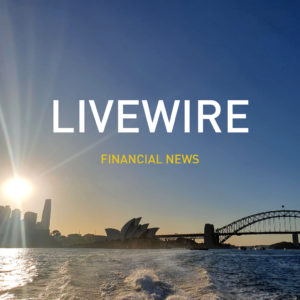The Intellectual Edge: Making Every Basis Point Count...
Coolabah Capital Investments (CCI) is a leading global active credit manager that is responsible for managing numerous institutional mandates, the Smarter Money Investments’ product suite, the Coolabah Active Composite Bond Fund (Hedge Fund) (CBOE: FIXD), the Coolabah Short Term Income Fund (Managed Fund) (CBOE: FRNS) and the BetaShares Active Australian Hybrid ETF (ASX: HBRD).
CCI’s edge is in “alpha” generation in liquid, high-grade global credit in contrast to traditional fixed-income strategies that drive returns through adding more interest rate duration risk, credit default risk, and/or illiquidity risk (or “beta”). This alpha is a function of the world-class analytical insights rendered by CCI’s human capital, which includes 40 executives with a long-term track-record of delivering prescient macro and quant insights. In 2019, CCI’s portfolio managers were selected as one of FE fundinfo’s Top 11 “Alpha Managers” based on their risk-adjusted performance across all asset-classes.
40
27
Over
$8.5bn
Full-time executives
Full-time investment & risk executives
in Funds Under Management
Global & regional fixed-income strategies
Long-only, long-short, zero duration, and long duration strategies
Offices in London, Sydney & Melbourne
40
Full-time executives
27
Full-time investment & risk executives
Over
$8.5b
in Funds Under Management
Global & regional fixed-income strategies
Long-only, long-short, zero duration, and long duration strategies
Offices in London, Sydney & Melbourne
Coolabah Capital Investments Pty Ltd (CCI) is an independent active credit alpha manager founded in 2011 and Chaired by experienced super fund director Melda Donnelly.
CCI is 65% owned by its investment team and 35% owned by the $83 billion boutique specialist investor, Pinnacle Investment Management, CCI owns 100% of the retail fund manager Smarter Money Investments Pty Ltd (SMI).

Pinnacle’s mission is to establish, grow and maintain a diverse stable of world-class investment managers. It holds equity interests in 16 specialist investment managers, including CCI, and provides them with a comprehensive range of high quality and cost effective infrastructure and other support services.

CCI is passionate about analysing and applying ESG insights as part of its investment process, and is a signatory of the UN-endorsed Principles for Responsible Investment (“PRI”). Find out more about CCI’s responsible investing policies here.
In addition to performing proprietary internal analysis, CCI evaluates ESG research prepared by industry-leading external providers such as MSCI, Sustainalytics, S&P and Bloomberg when assessing a company’s resilience to long-term, industry-material ESG risks. Insights provided by these experts assist CCI in identifying risks and opportunities that may not be captured by conventional financial analysis. Furthermore, CCI compiles the MSCI ESG risk rating for each of our exposures and targets a minimum portfolio MSCI ESG rating of ‘A’ to help ensure that our portfolios are not exposed to unexpected shocks. Portfolio ESG ratings are reported monthly to investors.
CCI believes that there is a significant role for liquid and low duration active credit alpha exposures to play in both individual and institutional portfolios. This is particularly true in a world where duration risks are unusually elevated.
Over time CCI has built significant comparative advantages in valuing complex fixed-income assets, highly differentiated quantitative research, intensive financial and commercial due diligence, active asset-selection and driving excess returns via pure credit alpha rather than conventional interest rate beta, credit beta, and illiquidity beta.
CCI is responsible for managing numerous institutional mandates, SMI’s portfolios, and the BetaShares Active Australian Hybrids ETF (ASX: HBRD) with total FUM of over $8.5bn as of October 2023.


Smarter Money Investments (SMI) is a wholly owned subsidiary of Coolabah Capital Investments that represents its SMI-branded public offer strategies.
SMI’s first solution, called the Smarter Money strategy, was launched in February 2012. SMI’s second solution, the Smarter Money Higher Income strategy, was publicly launched on 1 October 2014. SMI’s absolute return credit hedge fund strategy, the Long Short Credit Fund, was launched on 1 September 2017. These products are rated by Foresight Analytics, Lonsec, Mercer and Zenith, with specific ratings and reports available on request.
THE COOLABAH TREE
Coolabah’s name derives from the native Australian Coolabah tree (different sub-species are also referred to as “Coolibah”) that features in the de facto national anthem, Waltzing Maltida, which describes “a jolly swagman camped by a billabong under the shade of a Coolibah tree.”
The Coolabah is an extremely durable, salt-tolerant tree known to live for hundreds of years and offer shade for fauna. According to one account, “aboriginal use of Coolibahs was quite diverse — roots were used for emergency water supply, the inner bark was used against snake bite and the bark was harvested”.
The Coolabah tree’s traits of resilience, longevity, durability, and the capacity to facilitate innovation, are attributes that Coolabah’s business aspires to furnish its clients.
world-class analysis
CCI’s macro and quant forecasting prowess is well documented and has included, amongst other things, accurately predicting ahead of other analysts:
- the record housing boom between 2013 and 2017;
- the need for the bank regulator to introduce macro-prudential constraints on lending in 2014;
- the dramatic decline in the major banks’ returns on equity between 2015 and 2019 from 16% to 19% to around 11%;
- the record housing correction between 2017 and 2019;
- the otherwise unexpected upgrade of Australia’s sovereign credit rating to AAA “stable” in 2018;
- the early return of the federal budget to surplus in 2019;
- the shock outcome of the 2019 Federal election;
- the retention of franking credits on hybrid securities;
- the upgrade of the major banks’ senior bonds to AA- “stable” in 2019;
- the sharp housing recovery in May 2019;
- the upgrade of Australia’s economic risk score in 2019;
- the upgrade of the major banks’ stand-alone credit profiles from “a-” to “a” in 2019;
- the unanticipated upgrade of the major banks’ hybrids from a high yield BB+ rating to an investment-grade BBB- rating in 2019;
- the upgrade of the major banks’ subordinated Tier 2 bonds from BBB to BBB+ in 2019;
- in February 2020, the emergence of an extreme liquidity/solvency crisis in global financial markets because of investors’ inability to price pandemic risks, which would necessitate unconditional central bank liquidity and quantitative easing support;
- in February and early March 2020, the RBA commencing quantitative easing to mitigate the COVID-19 crisis, including government bond purchases and the provision of a term lending facility to banks along the lines of a Bank of England model, and the Commonwealth Treasury re-starting purchases of RMBS and ABS;
- in March 2020, the early April 2020 peak in COVID-19 infections in Australia, the US and Europe, months ahead of epidemiologists’ predictions;
- in March 2020, Australia’s early exit from COVID-19 containment in May 2020 on the back of the early peak in new infections and the aggressive flattening of Australia’s curve;
- in March 2020, aggressive mean-reversion in credit spreads of high-grade and liquid assets that benefited from central bank QE (CCI spent approx. $900m net buying assets during this time as credit spreads blew-out to historic wides);
- in March 2020, the tiny 0% to 5% correction in Aussie house prices (they fell 1.7%) followed by the advent of a recovery six months later in September 2020 with house prices officially increasing on a national basis in October 2020;
- in early July 2020, the late July 2020 peak in Victorian COVID-19 infections;
- in September 2020, the RBA’s QE 1.0 program; and
- in January 2021, the RBA’s $100bn QE 2.0 program.
Our Team
CCI’s global team comprises of 40 executives including 12 full-time portfolio managers and traders, and 13 analysts with decades of fixed-interest trading, quant and credit research experience.
CCI’s unique analytical and quantitative capabilities are recognised globally as the basis for unusually high win ratios and prescient projections. CCI’s leadership is often called on to advise government on complex economic policy formulation.
CCI’s chief investment officer co-developed the ideas for the Australian government to invest in the residential mortgage-backed securities (RMBS) market during the global financial crisis and more recently the SME loan (ABS) market. In 2018 CCI developed the world’s first hedonic index of RMBS default rates. In 2020 CCI published unique forecasting models for the COVID-19 pandemic that anticipated the early April 2020 peak in the first infection wave months ahead of epidemiologists’ predictions.
The team’s investment philosophy fuses both bottom-up and top-down quant asset pricing, credit rating and macro research with intensive operational, commercial and financial due diligence.
This is practically implemented via an extremely active style that has involved the team executing more than $20 billion of physical bond purchases and sales in 2020.
CCI’s Compliance & Risk Committee is chaired by the experienced funds management and superannuation executive, Ms Melda Donnelly, who is supported by Mr Robert Henricks.
Our Latest News

Joye: Investors no longer need to reach for risk in order to secure their return objectives
Coolabah Capital’s Chris Joye talks to the secular shift that is currently occurring into bonds…

Joye: Equities set for a “terrible” decade
In the age old battle of bonds versus equities, Coolabah’s Christopher Joye comes out swinging…

Pacific Asset Management and Coolabah forge new strategic partnership
Pacific Asset Management, the London-based asset manager and Coolabah Capital Investments, a leading global active credit fund manager, today announce the launch of the Pacific Coolabah Global Active Credit Fund.

Joye pulls no punches amid soaring bankruptcies, low productivity and the zombie apocalypse
Chris Joye from Coolabah Capital has big ideas and strong opinions, backed by data and insights…
SUBSCRIBE TO OUR NEWSLETTER
Enter your details below to keep up to date with all the latest news and information.


